
East German postcard by VEB DEFA-Studio für Spielfilme, Postdam-Babelsberg, no. 49, 1956. Photo: Pattenheimer.

East German postcard by VEB Progress Film-Vertrieb, Berlin, no. 159, 1956. Photo: Gerhard Puhlmann. Gérard Philipe and Jean Carmet on the set of Les aventures de Till L'Espiègle/Bold Adventure (Gérard Philipe, Joris Ivens, 1956).

East German postcard by VEB Progress Film-Vertrieb, Berlin, no. 115, 1956. Photo: Gerhard Puhlmann. Gérard Philipe and German actress Elfriede Florin, who played Soetkin in Les Aventures de Till L’Espiègle/Die Abenteuer des Till Ulenspiegel/The Adventures of Till Ulenspiegel (Gérard Philipe, Joris Ivens, 1956).
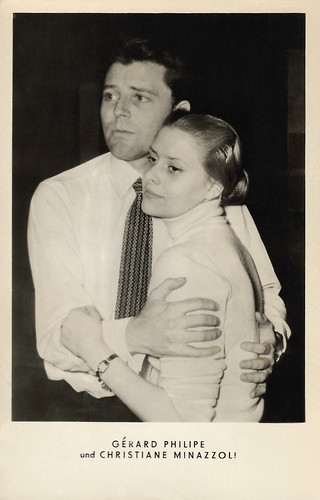
East German postcard by VEB Volkskunstverlag Reichenbach L.V., no. G 591, 1956. Photo: Zentralbild, Berlin. Gérard Philipe and Christiane Minazzoli, with whom he appeared in the play 'Ruys Blas' by Victor Hugo, directed by Jean Vilar at the Theatre National Populaire in Paris in 1954.
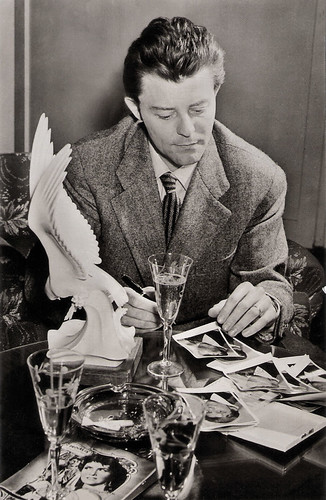
East German postcard by VEB Progress Film-Vertrieb, Berlin, no. 146, 1956. Photo: Gerhard Kiesling. Caption: Gérard Philipe gives autographs during his visit to Berlin.
A cheerful farce with a socially critical impetus
Flanders in the 16th century. In Les Aventures de Till L’Espiègle/Die Abenteuer des Till Ulenspiegel/The Adventures of Till Ulenspiegel (Gérard Philipe, Joris Ivens, 1956), the Duke of Alva (Jean Vilar) oppresses the Flemish people in the name of the Spanish king. At the very moment when Till Ulenspiegel (Gérard Philipe) and his beloved Nele (Nicole Berger) become engaged, the marauding band of troops reach the Flemish village of Damme. The rebel Claes (Fernand Ledoux), Tijl Uilenspiegel's father, is considered a heretic by the Spanish army. Tijl has to watch helplessly as his father is executed. "Long live freedom!" are Claes' last words before he dies at the stake. This experience, however, radically changes Till’s life: the young man, who was once the village lark and mischievous prankster, now becomes a fighter against the Spaniards and their governor, Alba. Together with his friend Lamme Goedzak (Jean Carmet), Tijl uses a ruse to enter the service of the Duke of Alva. That way he can better organise resistance against the Spanish. Prince William of Orange (Wilhelm Koch-Hooge) and the Beggars will assist him in this.
Gérard Philipe's real-life father, Marcel Philip, collaborated with the German occupiers during the Second World War. He was the administrator of the Parc Palace, the meeting place of the Germans in Grasse, and also a regional delegate and member of the "Comité directeur" of the Parti populaire français, a party founded by Jacques Doriot for the Alpes-Maritimes département. His son, Gérard, was his whole life a staunch social liberal and fought in the Résistance in August 1944, during the uprising for the liberation of Paris. Marcel Philip was imprisoned, first in Saint-Denis, then in Grasse. His son tried to use his connections to help him but was only partially successful. However, his father managed to escape in 1945 while his son was performing as Caligula in Paris. Marcel went to Spain and was sentenced to death in absentia. After an amnesty, he returned to France, ten years after his son's death.
Gérard Philipe came up with the idea of filming Charles De Coster's novel 'The Legend of Thyl Ulenspiegel and Lamme Goedzak' as early as 1949. However, it took him seven years to find producers who would support his project, as the book about Flanders' fight for freedom against the Spanish occupiers was considered too political and also criticised the Catholic Church with its Inquisition. The East German film company DEFA had been working on an adaptation of the material since the end of 1947, and Bertolt Brecht and Günther Weisenborn, among others, had been discussed as screenwriters. In addition, DEFA had been trying to have international artists appear in feature films since the beginning of the 1950s. Between 1956 and 1959, four co-productions were thus made between the GDR and France. Defa hoped to break the boycott to which its films were subjected in the East-West conflict: "The presence of world-famous actors such as Gérard Philipe [...] strengthens DEFA's self-confidence and promotes the international reputation of GDR cinematography."
Les Aventures de Till L’Espiègle/Die Abenteuer des Till Ulenspiegel/The Adventures of Till Ulenspiegel was shot in 1956 in non-socialist countries, i.e. countries with high exchange rates, in Sweden, the Netherlands and Nice, France. In Raguhn in Saxony-Anhalt, the battle between the Spanish and the Flemings was filmed with over a thousand extras in period costumes. The local cultural centre in Raguhn still bears the name 'Gérard Philipe'. Originally, the Dutch documentary filmmaker Joris Ivens was supposed to direct the film, and it was through his contacts that the co-production with DEFA ultimately came about. However, for scheduling reasons he had to cancel at the beginning of the shoot, so Gérard Philipe directed a film himself for the only time in his career. Ivens was sometimes at his side as an advisor. The film buildings were created by Léon Barsacq and Alfred Tolle. The costumes were designed by Rosine Delamare and Ingeborg Wilfert.
The film premiere of The Adventures of Till Ulenspiegel took place in Paris on 7 November 1956, shortly after the Hungarian People's Uprising against the ruling Communist Party had been crushed by the Soviet Army, leading to a great wave of indignation in France against the Eastern Bloc. French audiences reacted accordingly by flunking the film as a co-production with an East German film company. However, there were 2,304,114 admissions in France and thus the film was not a 'total commercial failure' as some sources suggest. The first screening in the GDR took place on 4 January 1957 at the Babylon cinema in Berlin. Pitt Herrmann at Filmportal.de: "GDR audiences took the national pathos of the title character, which was diametrically opposed to the internationalist aspirations of GDR socialism, as a reference to the 1956 Hungarian uprising, which was bloodily put down by Soviet troops. Of course, this was not the intention of the film people in Paris or Babelsberg." The many GDR postcards of Philipe give an indication how popular he was in the East Germany. The Encyclopedia of International Film described The Adventures of Till Ulenspiegel as a "large-scale production that suffers from directorial weaknesses". "Beautiful to look at, but rather tough" was the verdict of Cinema. Ralf Schenk wrote in the Berliner Zeitung that the film ultimately turned into "a turbulent, but also stylistically unbalanced, eclectic puzzle". As a "cheerful farce with a socially critical impetus", however, it could "still find its friends today", thanks above all to "the brilliant cast in supporting roles".
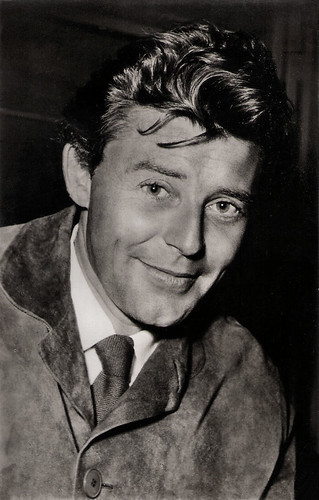
East German postcard by VEB Progress Film-Vertrieb, Berlin, no. 148, 1956. Photo: Gerhard Puhlmann.
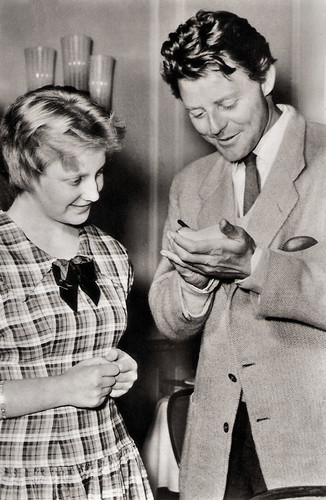
East-German postcard by VEB Progress Film-Vertrieb, Berlin, no. 158, 1956. Photo: Gerhard Puhlmann. Caption: Gérard Philipe is always pursued by autograph hunters.

East-German postcard by VEB Progress Film-Vertrieb, Berlin, no. 194. Michèle Morgan and Gérard Philipe in Les grandes manoeuvres/Summer Manoeuvres (René Clair, 1955).

East-German postcard by VEB Progress Film-Vertrieb, Berlin, no. 212. Dany Carrel and Gérard Philipe in Les grandes manoeuvres/Summer Manoeuvres (René Clair, 1955).
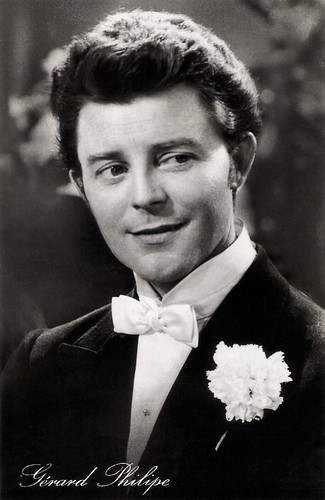
East-German postcard by VEB Progress Filmvertrieb, no. 1290, 1960. Photo: Gérard Philipe in Pot-Bouille/Lovers of Paris (Julien Duvivier, 1957).

East-German postcard by VEB Progress Filmvertrieb, no. 1294, 1960. Photo: Dany Carrel, Gérard Philipe and Danièle Darrieux in Pot-Bouille/Lovers of Paris (Julien Duvivier, 1957), adapted from the novel by Emile Zola.

East-German postcard by VEB Progress Film-Vertrieb, no. 2699. Retail price: 0,20 MDN. Photo: Gérard Philipe and Liselotte Pulver in Le joueur/The Gambler (Claude Autant-Lara, 1958).
Sources: Pitt Herrmann (Filmportal.de), Renaud Soyer (Box Office Story), Stiftung DEFA Filme, Wikipedia (French, German and English) and IMDb.
No comments:
Post a Comment